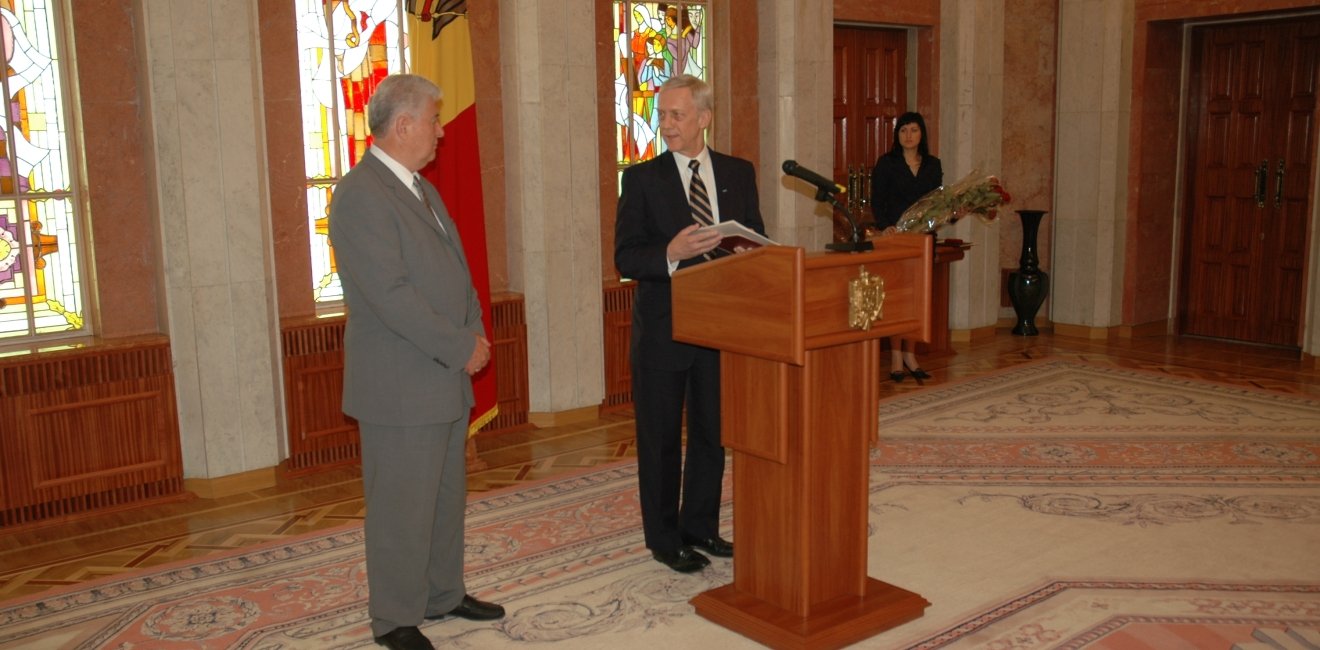
A blog of the Kennan Institute
BY WILLIAM H. HILL
At his annual press conference in December 2020, Russian president Vladimir Putin lamented that Western intervention had blocked a settlement of the Transnistrian conflict that he had agreed to with Moldovan president Vladimir Voronin and that would have resulted in the withdrawal of Russian troops from Moldova. Putin was referring to the November 2003 last-minute rejection by Voronin of the so-called Kozak memorandum, named after then Deputy Head of the Russian Presidential Administration Dmitrii Kozak, who engaged in shuttle diplomacy to reach the proposed settlement. A few days later Voronin justified his rejection of the memorandum on Moldovan television, and Kozak then weighed in with a long interview, adding more detail to Putin’s denunciation of the West in blocking the settlement.
The Kozak memorandum is old news; it has been seventeen years since Voronin called Putin to back out of the deal early in the morning on which it was to be signed. However, the issues addressed by the memorandum remain. Moldova’s Transnistrian region is still a separate, unrecognized entity, and some 1,500 Russian troops remain in Moldova against the express wishes of the recognized government.
At first glance, it might seem that Putin’s most recent remarks on the Moldova-Transnistria conflict and the Russian troop presence are little more than a repetition of long-held resentments. Nonetheless, if one compares his narrative with the actual sequence of events, one gains insight into enduring Russian perceptions and behaviors that have hampered Russia’s relations with its neighbors and the West over recent decades, if not longer. Putin is certainly correct that a settlement was at hand in Moldova and that Western interventions played a role in its failure. However, he is not correct that Western responses to the Kozak memorandum were “incomprehensible.” There were clear reasons to criticize some of the contents of the memorandum, and Moscow should have expected that the manner of its negotiation and presentation would provoke suspicion and criticism in the West.
First, it is important to recall the context: Russia’s relations with the West in 2003 were incomparably better than they are now. Despite differences on some issues, Moscow was supporting the US effort against Al Qaeda in Afghanistan and cooperating on a wide range of other issues. In Moldova, the United States was providing substantial financial support for the withdrawal of Russian troops, weapons, and military equipment. Russia met the first deadline (set at the 1999 OSCE Istanbul Summit) for this withdrawal in 2001. At the 2002 OSCE Porto Summit, the United States played a key role in blunting Moldovan objections to granting Russia a one-year extension on the second deadline. In 2003, American financial and diplomatic assistance was crucial in aiding Moscow in withdrawing thousands of tons of Soviet-era ammunition from Moldova.
The West, including the United States, also continued to work with Russia in seeking a political settlement to the Transnistrian conflict. As the head of the OSCE Mission to Moldova at that time, I was both a participant in and a witness to this cooperation.
Moldova got to the threshold of a Transnistrian settlement in November 2003 via a circuitous path. In February of that year, President Voronin proposed rewriting the Moldovan constitution to make Transnistria one of the subjects of a united federal state. Transnistrian leader Igor Smirnov accepted the proposal. The three mediators in the political settlement talks (the “five-sided negotiations”)—Russia, Ukraine, and the OSCE—supported the proposal and facilitated the establishment by Chisinau and Tiraspol of a Joint Constitutional Commission (JCC). As this body began to meet in July, the three mediators began in parallel to draft a document that would outline the basic government structures and divisions of authority in the federal state. This process took about five months and resulted in the so-called “Mediators’ Document,” which was ready for presentation to Moldovan and Transdnistrian negotiators in mid-November.
In midsummer, however, Russia unilaterally established a separate negotiating track with Moldova. In February, President Voronin told me he had appealed privately to Putin for assistance in the negotiations, remarking that the Russian Foreign Ministry was not doing a very good job. In August, Deputy Head of the Presidential Administration Kozak showed up in Chisinau and Tiraspol and began shuttle diplomacy to work out a separate political settlement document. We in the OSCE found out about Kozak’s involvement not from the Russians but from the Moldovans and Transnistrians; both sides gave me copies of the draft document Kozak was negotiating.
I asked to meet with Kozak, and found him a willing and intelligent interlocutor. I noted many similarities in our approaches to the settlement, and asked whether we could combine our efforts. Kozak told me the Moldovans wanted his track to remain separate, while Voronin told me the Russians wanted to remain separate. I was never able to pin down who was telling the truth. I kept in contact with Kozak, and friends in Chisinau, Tiraspol, and Moscow kept us apprised of the progress of his document.
Matters came to a head in mid-November, when I was authorized by the Dutch OSCE chair to present the Mediators’ Document. I was invited to the Russian embassy, where Kozak gave me the latest copy of his memorandum, noted that the Moldovans and Transnistrians had accepted it, and asked the OSCE to join in supporting this agreement. The timing would allow Moscow to report settlement of the Moldova-Transnistria conflict at the upcoming OSCE foreign ministers meeting in Maastricht in the first week of December.
I reported all this to my bosses in the Dutch OSCE chairmanship and consulted a wide range of OSCE delegations, including the United States and many EU countries. In the end, the OSCE decided that we could not support the document, since in our view it contained serious structural flaws in the proposed federation. However, we also decided we would not oppose it, since Moldovan authorities told us they supported and would sign the agreement. I relayed all this to Kozak and had an amicable discussion with him of our criticisms of the memorandum.
Four days later and two days before the scheduled signing of the memorandum, on my return from a weekend trip out of Moldova, I was presented a new version of the document, which contained three new articles concerning security arrangements, peacekeeping guarantees, and a Russian troop presence in the country until 2020. When I reported the new text to the OSCE, there was a predictable, unfavorable reaction from a number of Western countries. Many of these objections were communicated to President Voronin and his colleagues, but it is not clear how much of a role these played in his last-minute rejection of the memorandum. There was considerable Moldovan domestic opposition to the memorandum, including mass demonstrations. In his most recent remarks on Moldovan television, Voronin himself downplayed the influence of Western pressure.
President Putin is certainly correct that a real opportunity for reconciliation was lost in Moldova in November 2003. There were undoubtedly Western mistakes, here and elsewhere, that may have contributed to this unfortunate outcome. However, placing the blame solely or primarily on the West overlooks several Russian decisions and actions that also contributed to this lamentable but predictable result.
First of all, the decision to establish and maintain a separate, unilateral Russian negotiation track may have facilitated Kozak’s shuttle diplomacy, but it also raised suspicions and eroded confidence in the outcome on the part of those who were not participants. Putin is a vociferous critic of Western, in particular American, unilateralism in other forums and instances. As such, he should be well aware of the counterproductive aspects of unilateral approaches to issues where broad international buy-in and support will eventually be required. From my own personal experience with Kozak, I continue to believe that we might have achieved Western buy-in and a lasting solution had we been able to join our negotiation tracks.
Second, in seeking to obtain a dramatic result in time for the OSCE ministerial meeting, Moscow did not give itself time to deal with unexpected objections or reversals. The agreement of Tiraspol and Chisinau was in hand by late November. One can only wonder what might have happened if first the amended memorandum were shown to other stakeholders, negotiations were held to deal with possible objections, and only then the signing ceremony were scheduled. The result could not have been worse than what actually happened.
Third, I continue to wonder how long my Russian colleagues thought the articles dealing with the Russian troop presence could remain unknown to the West, and what would happen when their Western partners found out. Months later a senior Russian colleague argued vehemently to me that there were real provisions for outside, Western participation in the Moldova-Russia bilateral security agreement envisioned in the memorandum. In retrospect, I cannot be certain that he was completely wrong in this. However, by presenting the memorandum as a fait accompli, our Russian colleagues never gave us a chance to inquire or discuss the subject before rejecting the agreement. We found common language with our Russian colleagues on peacekeeping and security guarantees in the Mediators’ Document. Given the better relations and closer cooperation that existed in 2003, success in this endeavor was not out of the question.
Instead, failure of the Kozak memorandum in Moldova in November 2003 joined the Rose Revolution in Georgia, the Orange Revolution in Ukraine, and other collisions in a series of events viewed by Russians as Western efforts to effect regime change and eliminate Russia’s influence in its “near abroad.” A different result in Moldova may not have altered the course of this deterioration in relations, but it remains intriguing to speculate on possible alternatives to what actually occurred.
The most enduring lesson from the failure in Moldova is reflected in President Putin’s most recent remarks on the Transnistrian question. This is Moscow’s continuing concentration on Western mistakes—of which there are admittedly enough—and failure to consider the logical, predictable, obvious effects of its own conduct on its interlocutors. Russian leaders today argue that Western suspicion and hostility to Russia prevent reconciliation, improved relations, and cooperation. Whatever truth there may be in such assertions, Russian leaders also need to recognize the role of their own actions in producing or magnifying such suspicion and hostility. This is not a demand for Russian capitulation to Western views but rather a call for adoption of a less accusatory, more pragmatic approach to defining the issues that divide us as the first step in managing and resolving them. Those who would prefer to work with rather than against Russia in tackling our common problems cannot do so alone; they will also need Russia to meet them halfway.
The opinions expressed in this article are those solely of the author and do not reflect the views of the Kennan Institute.
Author

Former Professor of National Security Strategy, National War College, Washington D.C.

Kennan Institute
After more than 50 years as a vital part of the Wilson Center legacy, the Kennan Institute has become an independent think tank. You can find the current website for the Kennan Institute at kennaninstitute.org. Please look for future announcements about partnership activities between the Wilson Center and the Kennan Institute at Wilson Center Press Room. The Kennan Institute is the premier US center for advanced research on Eurasia and the oldest and largest regional program at the Woodrow Wilson International Center for Scholars. The Kennan Institute is committed to improving American understanding of Russia, Ukraine, Central Asia, the South Caucasus, and the surrounding region through research and exchange. Read more

Explore More in The Russia File
Browse The Russia File
Chechnya as a Model of Modern Russia

Russia’s Indigenous Communities and the War in Ukraine

Gas and Power in a Changing US–Russia Relationship

